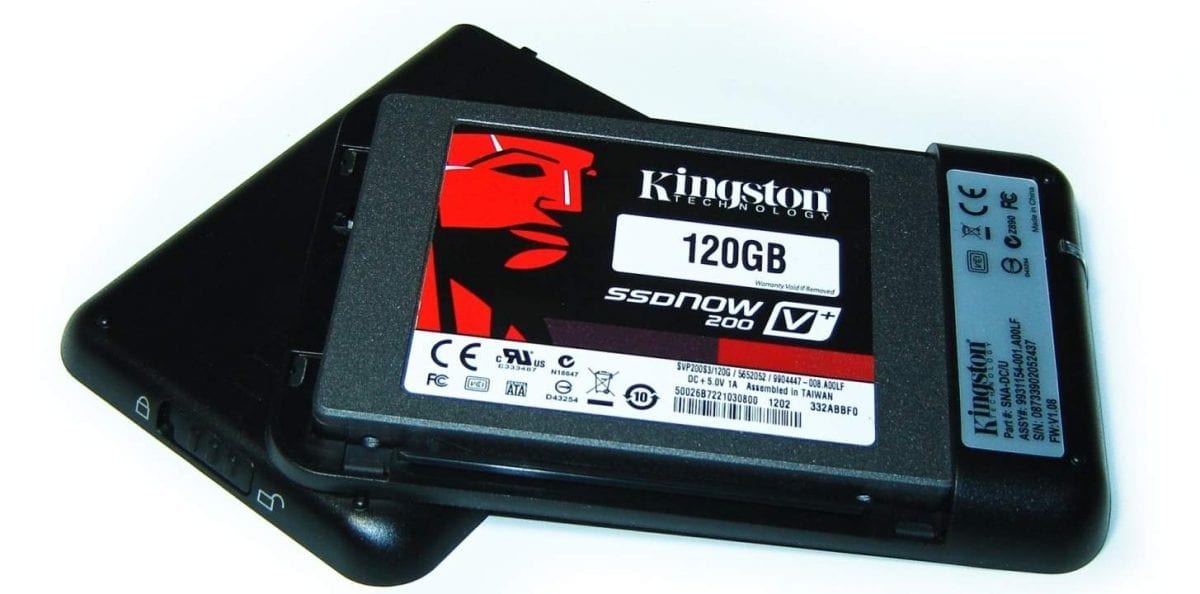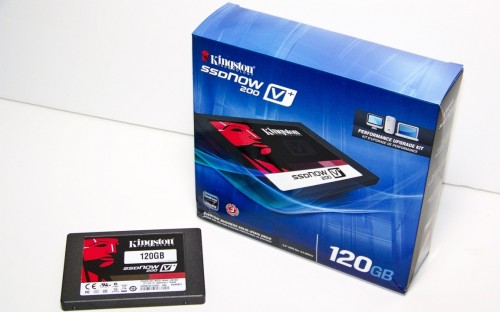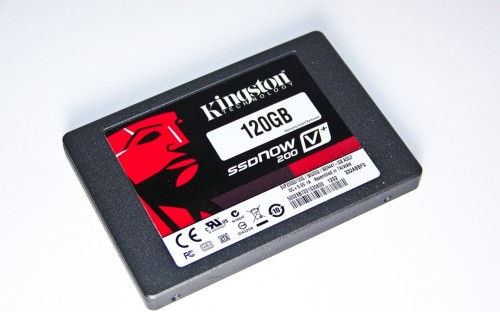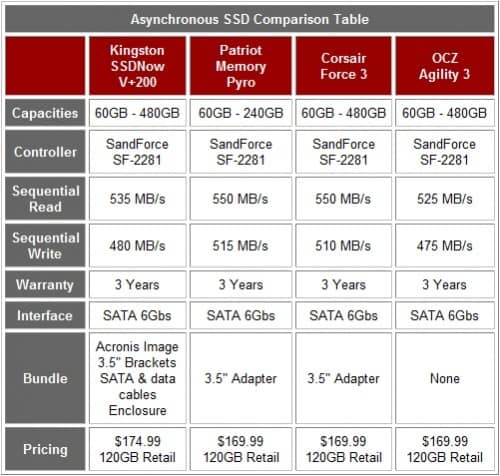A few weeks ago, I took a close look at Intel’s own premium 520 series SSD which uses a SandForce SF-2281 controller and 25nm synchronous NAND inside. Like any premium performance SSD, it also carries a premium price. That price is still a tough pill to swallow for the bulk of the consumers. Using more affordable asynchronous NAND to can cut costs, but some users might worry that it means lower performance. Kingston has been working with the low cost NAND and has put it into a new SATA6Gbs SSD called the SSDNow V+200 series targeting enterprise and businesses with an ‘everyday business SSD’ that greatly improves productivity whether in desktops or notebooks. The performance and especially the price may surprise you. Let’s have a look!
Features and Specifications
The SSDNow V+200 series comes in 60, 90, 120, 240 and 480GB models in both stand alone and upgrade kits. The series uses the SandForce SF-2281 controller to utilize the Intel 25nm Compute 3K asynchronous NAND which improves the SSD’s endurance. The controller features advanced wear-leveling, TRIM support, S.M.A.R.T. Tools and DuraClass technology. All this equates to a SATA6Gbs SSD with a three year warranty.
The V+200 is rated similarly to the competition’s asynchronous models. The SSD is rated up to 535MB/s read and 480MB/s write sequential performance. While that’s great and all, the 4K data block performance still highly dictates the SSD’s overall desktop experience. We’ll have a look at that in testing later. With all the major SSD players offering similarly configured SATA6Gbs, it comes down to performance, accessories, warranty and finally, price. Currently, the V+200 series can be found for $164.99 for the stand alone SSD and $174.99 for the upgrade kit.
Here’s something else you might not have seen. The V+200 240GB retails for as little as $334.99 from places like Newegg. That’s a lot easier to stomach than the $450+ averages we’ve seen the last year. I hear a lot of people saying “we wants the precious” but want to pay less for it.
What’s in the Upgrade Kit?
While just about any SATA6Gbs gives your computer a big boost in performance, there aren’t any little blue pills inside. What you will find inside the upgrade kit are Acronis True Image migration software. Just mirror over the data off your platter drive to the SSD for quicker up time.
The kit also includes 3.5″ brackets for mounting in standard hard drive bays, a SATA power cable, and a data cable. It also comes with a useful SSD enclosure, useful for cloning or for extra portability for enterprises users moving a lot of data which happens often. I found it useful for housing smaller 30 to 64GB SSDs lying around in the lab also.
Test System and Configuration
After doing a little digging, I managed to assemble the four primary asynchronous SATAIII SSDs that are under the $200 price level. I tossed in one synchronous SATAIII to give you an idea as to where it falls in terms of performance.
- Processor: Intel Core i7-3630X Sandy Bridge-E
- Motherboard: ASUS P9X79 Deluxe
- Memory: Kingston HyperX Genesis 16GB 1600MHz Quad Channel DDR3
- SSD Competitor 1: Kingston SSDNow V+200 120GB
- SSD Competitor 2: Patriot Memory Pyro 120GB
- SSD Competitor 3: Corsair Force 3 120GB
- SSD Competitor 4: Patriot Memory Inferno 120GB (SATAII)
- SSD Competitor 4: Corsair Force GT 120GB (Synchronous)
- Graphics: MSI Geforce GTX 560 Ti TwinFrozrII
- Power Supply: Antec CP-850
- OS: Windows 7 Pro 64-bit
The latest Intel Rapid Storage driver was installed. All the SSDs were updated to latest available firmwares, but updating an SSD involves some slight risk making it prudent to back up your data. Once you update they can never be rolled back to the previous firmware. And, finally, all the SSDs are at least 60% capacity for a better real world result.
Benchmark Notes
The programs used to test the V+200 SSD included Crystal Disk Mark for its intense data compression, ATTO for IO performance and PCMark7 which provides more tangible results in regards to overall system performance in day to day tasks. That’s why you continue to hear leading engineers say it’s the quickest, easiest performance update you can give your system. A far better bang for the buck than any CPU or memory upgrade for the time being.
Now that we’ve established all our testing parameters, let’s move on directly to testing!
CrystalDiskMark
CDM is pretty brutal when it comes to data compression tests. After running three tests each, we got a pretty good idea just how the SSDs handle sequential and especially 4K block performance.
Sequential performance is close between most of the SSDs with the exception of the Force GT. However, the V+200 stretches further in the 512K and 4K write compression test. This means the SSD should make more efficient use of the system during data intensive tasks. Let’s find out more in the next test.
PCMark7
For this test, PCMark7 was executed three times using default settings to get an average score. This is about as good a real world reveal as any because the SSDs are the only large variable that affect the test system’s performance.
The surprise here is that the V+200 falls between the asynchronous and synchronous SSDs in overall system performance. Given the strong performance, it kind of makes me want to opt for the cheaper V+200 till the premium SSDs comes down in price.
ATTO
ATTO typically helps any SSD produce some impressive numbers compared to platter hard drives. High IO data performance goes hand in hand with system performance. For a better comparison as to how an SSD’s controller affects IO performance, the Kingston HyperX, Patriot Memory Wildfire were added. Let’s have a look at the results for the four SSDs in a overlapped IO test. Remember, these drives are weighted down with plenty of data.
The surprise here is how well the V+200 does in the IO output. It actually outpaces the other SSDs. Keep in mind that like RAM modules, NAND can be optimized to better support the controller. Whatever tuning Kingston is giving to the Intel 25nm NAND inside, it’s working!
Final Thoughts
Kingston designed this as a professional series asynchronous SSD for users who want a little more performance without paying the full price that accompanies asynchronous SSD. This saves users anywhere from $75 to $100 depending on the commodity price of the NAND at the time of assembly. This also gives Kingston and its retailers a little more room to bargain as more SSDs hit the shelves. Plus, this is the easiest enterprise upgrade you can add that greatly improves overall system performance. Businesses that encrypt their data or rely heavily on fast rendering times of files, will immediately see benefit by reducing the hours spent on a project.
At present, the Kingston 120GB SSDNow V+200 is the fastest asynchronous SSD available. We hope that other companies rise to the occasion as well so that more consumers can enjoy the benefits of SSDs. Its performance falls more towards the premium SSD side without the cost to match. And, it offers the best comprehensive upgrade bundle of any SSD. Users get everything needed to get started on any desktop or laptop. The Acronis software comes in really handy and will save you time from having to completely start Windows over.
Factoring in an MSRP of $179.99 and dropping, the Kingston V+200 wins our Editor’s Choice for being the fastest asynchronous SSD that a “little less” money can buy.
Pros
- Fast asynchronous performance
- Very good bundle and accessories
- Good overall value
- Acronis Cloning Software incuded for quick migration
Cons
- Larger capacities are still a bit on the spendy side
Overall Rating: 9.5 / 10.0
Help Us Improve Our Reviews By Leaving a Comment Below!




